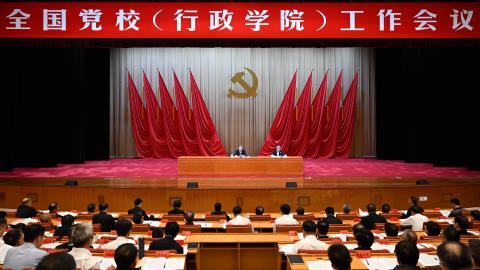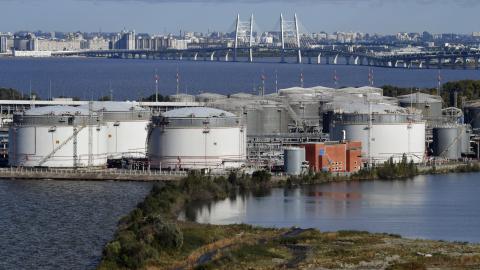For the past decade, Japan's stagnation has elicited much discussion and a plethora of prescriptions, but very little real anxiety. The U.S. economic boom carried the world and sustained demand for goods from all regions including Southeast Asia.
What a difference a year makes. The U.S. economy is now limping along, and the entire world is haunted by the prospects of economic slow-down or recession. No other large economy is strong enough to substitute for the United States as the engine of world growth.
From a regional perspective, no country seems able to pull its neighbors up. Germany is no longer the locomotive of European economic growth, and Japan's weakness threatens the stability of Asia. Markets greeted the election of Japanese Prime Minister Junichiro Koizumi with some excitement, but enthusiasm is now waning and the Nikkei equity index has declined substantially from its earlier rally. No one is sure that the Prime Minister's proposed shock therapy can ever be implemented. Nor is anyone convinced that his reform package is appropriate.
Current proposals call for severe restraints on government spending and public borrowing. They include measures to force banks to accelerate the disposal of bad loans and allow unprofitable companies to go bankrupt. Clearly, the Prime Minister must be credited for acknowledging his country's dire economic predicament, and for his desire to end government profligacy and financial mismanagement. His July 29 victory in Upper House elections signals that a great many Japanese want change. At issue, however, is the huge risk that budgetary stringency combined with reforms that encourage business failures and unemployment will plunge the country deeper into recession.
Japanese banks estimate their non-performing loans to be in the order of US$100-billion, but most analysts would argue that the real number is between US$300-billion and US$400-billion. Rapid disposal of bad loans of this magnitude would inevitably trigger bank failures, large industrial bankruptcies and layoffs, and the resulting weakness would, in turn, expand bad debt. The short-term effect would be to further weaken the Japanese economy.
This is not an argument against banking reform and economic restructuring. However, it does raise questions about Prime Minister Koizumi's ability to carry out true and effective reform. Already his resolve may be wavering. On June 22, the Lower House of Parliament passed an amendment allowing banks to count some of their reserves for loan losses as retained earnings. This will help banks with their capital structure and will soften the effects of a requirement to 'mark to market' which takes effect Sept. 30. Nevertheless, this will not completely dampen the pain of reform and is unlikely to muster increased support for the Prime Minister.
Mr. Koizumi is seen as a maverick, not as a consensus builder. He already faces a trove of conflicted interests within his own party as he threatens traditional power blocs such as the construction industry, which has thrived on government largesse. The stubborn and inflexible Japanese bureaucracy simply cannot abide views such as his and will try to sabotage reform by endlessly 'studying' every new proposal. If Japanese public opinion flinches, it will be impossible to carry out reforms without accompanying measures to assuage the pain. In any event, such measures are desirable to make the Prime Minister's program more effective.
For example, in all likelihood, Japanese markets will be disrupted not only by bank and industrial failures but also by the sale of cross-shareholdings of financial institutions. Foreign investors could help support markets, but, thus far, little thought has been given to policies to deepen and broaden capital markets and attract foreign investment. On the contrary, the mood in Japan seems to be increasingly nationalistic.
Mr. Koizumi hopes that the proposed privatization of the country's postal savings system will help mobilize the world's largest single pool of capital -- estimated to be roughly US$2-trillion -- to sustain market strength. He not only has underestimated the virulent opposition of another Liberal Democratic Party power bloc -- the postal workers -- but also the complexity of such a privatization process. He is likely to be submerged by 'careful study' after 'careful study,' and damaged by the reticence to seek advice from foreign, experienced private equity managers whose knowledge is not shared by Japan's postal workers or government bureaucracy. One cannot effectively and rapidly mobilize such a pool of capital without a deep understanding of capital and equity markets, and Japan will have to look beyond its borders for such advice.
Finally, in all of Prime Minister Koizumi's sound bites and broad-brushed proposals there is virtually nothing on the monetary dimensions of Japan's problems, even though the country has been plagued by deflation for many years. The GDP price deflator is down 1.2 % this year, and the index of commercial land prices in the country's largest urban areas -- already down 80% in the past decade -- continues to decline. Deflation bankrupts debtors and increases credit risks -- a situation not conducive to increased lending and economic recovery.
Proposals for fiscal tightening and economic restructuring that do not include a looser monetary policy threaten to so weaken the economy as to demolish any support for continued reform. The Bank of Japan cannot lower interest rates, but it can buy more government debt and, in effect, mint money. The current governor of the Bank of Japan fears that a more relaxed monetary policy will delay structural reform. On the contrary, without support from the monetary authorities, reform will stop.
Prime Minister Koizumi confronts huge challenges from all the traditional players in the Japanese economy. The world will be watching his every move to realign traditional interests towards his reform package. Success will depend on his ability to refine existing proposals, to loosen monetary policy, and to sustain public support for at least another two to three years. It would be naive to expect real results before then.











